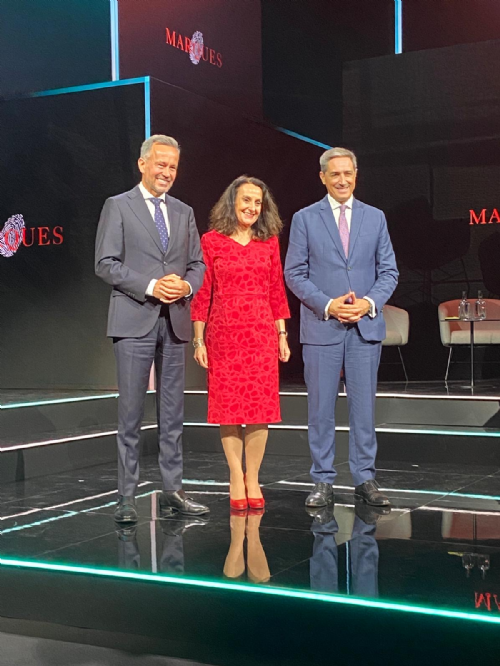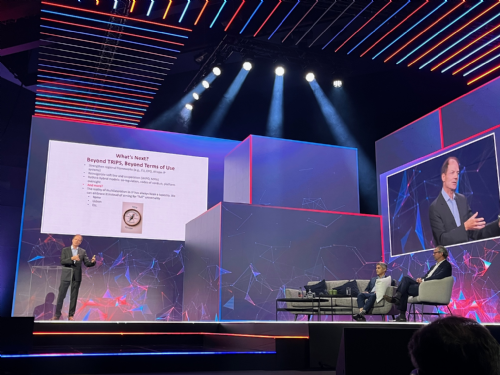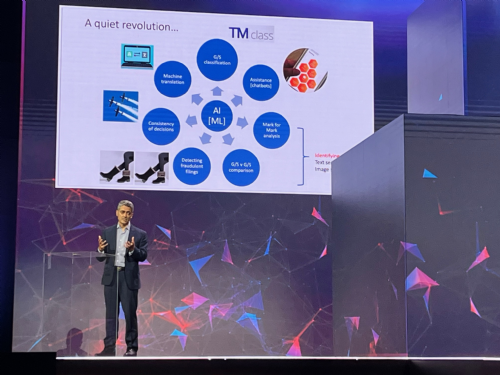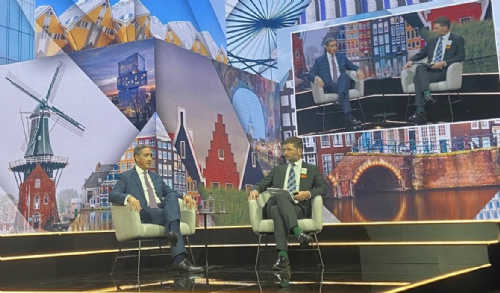Now in its twelfth year, Class 46 is dedicated to European trade mark law and practice. This weblog is written by a team of enthusiasts who want to spread the word and share their thoughts with others.
Click here subscribe for free.
Who we all are...
39th Annual Conference: parts 1 and 2
 |
| Hugues Derème, Claudia Pappas and João Negrão |
MARQUES Chair Claudia Pappas, Thyssenkrupp Intellectual Property GmbH, Germany opened the 39th MARQUES Annual Conference in The Hague this morning (17 September).
Following a dramatic entrance that featured characteristic Dutch sights and music, she spoke about the host city of The Hague and MARQUES achievements during the past year and welcomed guests from EUIPO, WIPO, BOIP, ECTA and CTA.
She also thanked the more than 440 Team members who drive the work of MARQUES and announced the creation of the MARQUES Rising Star Award.
As part of the Opening Ceremony, Hugues Derème, Director General, Benelux Office for Intellectual Property (BOIP), The Netherlands, gave a presentation focusing on three themes, all of which relate to BOIP 2030, the Office’s Strategic Plan:
First, from registration to significance. “IP Offices were seen as registries; interactions with users were purely transactional. This time is over,” said Mr Derème. “IP Offices must be relevant and we must make a difference.” This means helping businesses, especially SMEs, to understand how to use IP, and engaging with IP professionals.
Second, from borders to bridges. “In a digital world, customers don’t think in jurisdictions, counterfeiters don’t respect them and creators don’t look at them, “ said Mr Derème. He said BOIP wants to build bridges with users, businesses and society at large. For example, it has a new data strategy, cooperation projects to support dispute resolution and IP finance and investment in public affairs and new tools such as Name checker. “With all these actions, we are getting IP out of its niche,” he said.
Third, moving from ownership to stewardship. “IP is about protecting creativity responsibly, balancing protection with openness,” he said. “IP is not just about locking up, it’s about creating opportunities while keeping the ecosystem fair and competitive.” With this aim, BOIP is looking at its fee structure to make it fit for purpose, as well as internal policies and interactions with stakeholders and others.
Mr Derème closed by noting that The Hague Agreement was signed on 6 November 1925 and an event will take place to mark the 100th anniversary at the Peace Palace on 6 November this year.
Big thinking about how we work
Gregor Vos, Brinkhof, The Netherlands and Member of the MARQUES Programming Team. introduced part 1 of the Annual Conference, titled: “How will external factors change the way we work?”
 |
| Professor Daniel J Gervais |
Professor Daniel J Gervais, Vanderbilt University, Nashville, USA asked: Who makes IP rules now? He traced the history of the Paris Convention and the “convergence” of rules since 1883. “It’s a truly universal agreement, with 181 countries,” he said. In the 1980s, there was a boom in international trade that led to the TRIPs Agreement and the WTO dispute settlement body and appellate body.
Today, the US is shifting to a unilateral stance on many issues, and that includes resistance to the WTO. “In a way, we’re back to pre-1883,” said Prof Gervais, who asked: will countries favour tariffs and trade restrictions rather than convergence? But commerce is international, and businesses may therefore increasingly rely on contracts.
“There’s a big difference between a contract and a treaty,” said Prof Gervais, noting that treaties incorporate the public interest. As rules become more “fuzzy”, the importance of terms of use in user agreements is growing. “Clearly the system is under strain,” said Prof Gervais. “The price of inaction will be high”. He predicted that private rules will fill the void and regulation on topics such as AI will diverge.
AI and trade marks
 |
| Professor Dev Gangjee |
Picking up on those concerns, Professor Dev Gangjee, University of Oxford, UK discussed the role of technology and AI in trade marks, from classification to machine translation and consistency of decisions. “AI has quietly slipped into the trade mark system, and is very useful in a number of domains,” he said, but added that we should “calibrate our expectations” about AI.
He asked: How good is AI today? Focusing on machine learning image recognition in EUIPO’s TMView and WIPO’s Global Brands Database, he said that “Content-based image retrieval is difficult: expect the tools to misfire.” Image recognition is a hard task, and there are limitations.
Second, he asked: How far can AI go? Citing research that used ChatGPT in trade mark examination and other research using a machine learning tool, he suggested that AI can decide clear cases but is less confident, and less useful, when it comes to borderline ones.
Finally, he asked whether agentic AI will lead to the death of trade marks: “Where is the average consumer going if you have a robot consumer?” Noting that AI undermines autonomy, Prof Gangjee said that research suggests AI/autonomy trade-offs are possible in areas such as buying complex products but not generally.
For example, people may rely on trusted apps to recommend and even make buying decisions in certain cases. “We are making some progress to a hybrid, AI-assisted consumer,” he said. This raises questions for trade mark law, such as: do we revisit the Google France consensus? And will there be a move towards dilution claims rather than confusion?
Concluding the presentations, Prof Gervais briefly discussed AI, copyright and patents. “What is the future for human creators and inventors?” he asked. At the moment, courts are deciding these questions, but more debate is needed. “This is bigger than the internet,” he said. “I urge caution when trying to persuade a court that a machine can be inventive or creative.”
“We in the IP world have a very important task to ensure that when we say progress, we mean human progress,” he concluded.
Keynote interview
 |
| João Negrão and James Nurton |
Part 2 of the Annual Conference comprised an interview with João Negrão, Executive Director, EUIPO conducted by the MARQUES editor, James Nurton and introduced by Claudia Pappas. Claudia welcomed Mr Negrão to the Annual Conference and commented on the extensive collaboration between EUIPO and MARQUES.
In a short presentation and in response to questions, Mr Negrão discussed the Office’s evolution and its Strategic Plan 2030, the digital transformation and the impact of AI tools, collaboration with users, new responsibilities in the areas of geographical indications and copyright, improving access to the IP system and promoting innovation in Europe.
This year’s Annual Conference is taking place all this week. Further posts will be published on the MARQUES blogs during the week.
Posted by: Blog Administrator @ 17.04Tags: Annual Conference, The Hague, EUIPO, BOIP,


 Sharing on Social Media? Use the link below...
Sharing on Social Media? Use the link below...Perm-A-Link: https://www.marques.org/blogs/class46?XID=BHA5382

